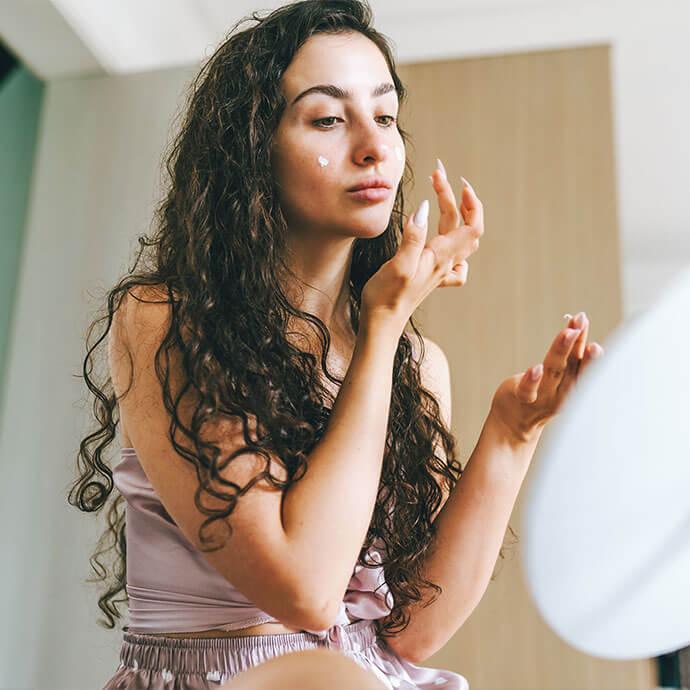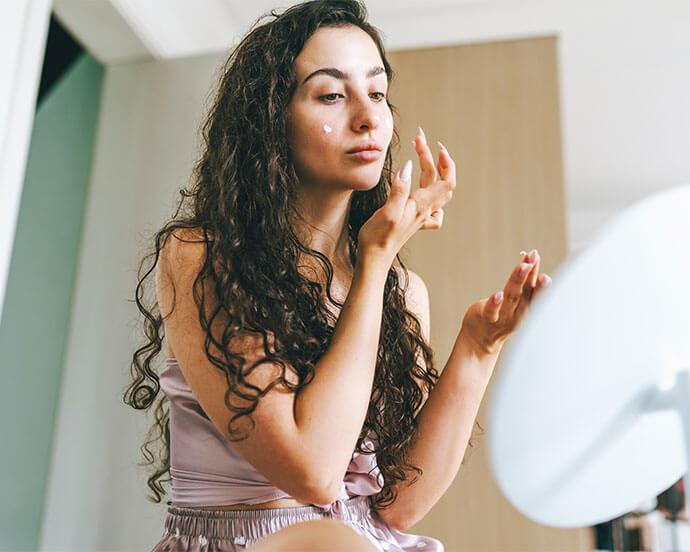10 Derm-Approved Ways to Zap Whiteheads



Lindy Segal


Acne may be one of the most common skin concerns, but most of the time we need to be a little more specific. Because not all acne is the same, not all acne can be treated the same way. One of the most common—and chronic—kinds of acne? The whitehead.
“Whiteheads are skin-colored bumps that can occur anywhere on the face, but are most common in the T-zone, where we have the highest concentration of oil glands,” explains dermatologist Joshua Zeichner, MD. So what causes whiteheads, and how do we clear them up? We’re here to answer that question, with Dr. Zeichner’s help. Read on for how to get rid of whiteheads stat.
It's about glam time you treated yourself.
Join IPSY

MEET THE EXPERT
Joshua Zeichner, MD, is a dermatologist and Director of Cosmetic and Clinical Research at Mount Sinai Hospital in New York City.
What causes whiteheads?
Unlike inflammatory acne, bacteria isn’t the culprit here—clogged pores are. “They are caused by a buildup of oil that gets trapped underneath sticky skin cells that block the opening,” says Dr. Zeichner. Hormones play a role in how much sebum your pores produce, as do external factors like exercise. And while bacteria doesn’t cause whiteheads, it’s still a concern; when they aren’t treated properly, whiteheads can turn into a bigger problem (more on that in a minute).
How to get rid of whiteheads:
1. Do nothing.
The first rule of whiteheads: Don’t talk about whiteheads. Kidding! But please don’t touch them, OK? “Whiteheads have a narrow connection to the surface of the skin, making them difficult to pick on your own at home,” explains Dr. Zeichner. “Oftentimes they need to be opened up to create enough room for the contents to be expressed. While your dermatologist has the proper tools and training to do this, at-home attempts often cause more harm than good.”
Some of that harm includes worsening the zit, or even permanent skin damage. “Ultimately, [picking] may make it more difficult to clear the whitehead in the future. Plus, the scabs that result from picking often last much longer and look much worse than the original pimple,” says Dr. Zeichner. “Picking the skin can damage the outer skin layer, creating cuts and wounds that may become infected. In severe cases they can even cause scarring.” Instead, consider one of these safer alternatives.
2. Try tea tree oil.
“Tea tree oil has anti-microbial and anti-inflammatory properties,” says Dr. Zeichner. It’s also a “clean” ingredient option for those looking to detoxify their skincare routines. A face cleanser with tea tree oil, like ESSENHERB Tea Tree Foam Cleanser, helps kill bacteria and reduce oil without drying out skin.
3. Use witch hazel.
If you’ve always wondered what witch hazel is, there’s no better time to pick some up at the drugstore. “Witch hazel is an astringent that helps dry out oily skin and balance the skin’s pH,” says Dr. Zeichner. Derived from a plant called "Hamamelis virginiana," a shrub that grows around the east and midwest of the U.S. and Canada, witch hazel is distilled with alcohol and water to create a simple, natural toner for overactive pores.
4. Try retinoids.
You’ve likely heard about the benefits of retinol for anti-aging, but it’s just as useful in the acne department too. Retinoids, which are derived from vitamin A, “act like pipe cleaners to keep the pores clear,” says Dr. Zeichner. (As for the difference between the two: Retinoids are more highly concentrated and often only available by prescription, while retinol is milder and what you’ll find in over-the-counter formulas.) For whiteheads specifically, a retinol-spiked essence or serum can help control oil and exfoliate dead skin cells, revealing a smoother, glowier complexion. And if you do have a weak moment and pop one (tsk, tsk!), retinoids can help fade acne scars, too.
5. Look for products with salicylic acid…
If there were an award for “most popular ingredient” in acne-fighting products, salicylic acid would probably win. “Salicylic acid is a beta hydroxy acid that removes excess oil and dead cells from the surface of the skin,” explains Dr. Zeichner. In other words, it both gently exfoliates skin and unclogs pores like a champ, making it especially effective at eliminating blackheads and whiteheads. Look for salicylic acid in everything from cleansers to masks to spot treatments like MURAD's Rapid Relief Acne Spot Treatment. Containing 2% salicylic acid (the maximum over-the-counter concentration approved by the FDA), it works “basically overnight” to clear blemishes, according to our Ipster community.
6. ...or benzoyl peroxide.
Arguably the other most common over-the-counter treatment, benzoyl peroxide is often mentioned (or even used) interchangeably alongside salicylic acid—but the two ingredients function very differently. While salicylic acid unclogs pores, benzoyl peroxide “lowers levels of acne-causing bacteria and reduces inflammation in the skin,” explains Dr. Zeichner. “It can be used for all types of acne, but is especially useful for red, angry pimples.” Benzoyl peroxide is a solid choice for oily skin types, but those with sensitive or dry skin may prefer products with salicylic acid, which is known to be gentler on the skin.
7. Exfoliate carefully.
Not only can you exfoliate if you have whiteheads, but you should; gentle exfoliation is key to keeping pores clear. However, it’s important to avoid harsh scrubs that could irritate or worsen acne.
“I typically recommend chemical exfoliators that contain ingredients like glycolic and salicylic acid,” says Dr. Zeichner. A favorite among Ipsters is MURAD’s AHA/BHA Exfoliating Cleanser, which combines salicylic, glycolic, and lactic acids for an unbeatable glow. “These hydroxy acids help remove excess oil and dead skin cells from the surface of the skin to open the pores,” says Dr. Zeichner.
8. Try a spot treatment.
Although your entire skincare routine can help address whiteheads, a spot treatment is usually the most direct course of action for clearing any type of acne, fast. There are great options containing every active ingredient, but Ipsters love the Acne Control Blemish Spot Treatment from GOODNDOC. The cream-based formula is made with tea tree oil and squalane, so it fights breakouts without drying out skin.
9. Use aloe vera.
Calming, hydrating aloe has a long list of uses—including for acne-prone skin. “Aloe vera can help hydrate the skin and soothe inflammation. It is a useful ingredient for irritated, acne prone skin,” says Dr. Zeichner. Try putting a dab of aloe vera gel on as a spot treatment, or using it as a lightweight gel moisturizer (if you have sensitive skin, be sure to use an unscented variety).
10. Try a hydrocolloid acne patch.
Acne patches skyrocketed in popularity recently, and even celebrities and influencers have taken to showing off theirs on Instagram. So what exactly are they—and how do they help whiteheads?
“Hydrocolloids are dressings used to help wounds heal,” explains Dr. Zeichner. “When the patches are applied over pimples, they help absorb excess fluid and provide a protective barrier to help it heal quicker.” The benefits are two-fold: First, the material absorbs the gunk inside the zit (which is #oddlysatisfying). Second, the barrier physically stops you from touching the pimple, which we know is The First Rule of Whiteheads. They come in all sorts of shapes and colors, but CUROLOGY’s Spot Control patches are semi-transparent, so you can wear them any time of day while they work their magic. Ipsters also love “how well they blend with the skin” and that they “help clear up pimples overnight.”
Want in on all the IPSY Glam Bag fun? Take our Beauty Quiz now to get started. Already an Ipster? Refer your friends to earn points, which you can use toward products. Either way, don’t forget to check us out on Instagram and Twitter @IPSY.
Liked this post? Share!
Related Stories
How-To
Try a Soft Goth Aesthetic This Season to Evoke Your Inner Wednesday Addams
Published on Feb 23, 2023


How-To
How to Cover Melasma With Makeup Like a Pro in 4 Simple Steps
Published on Sep 26, 2025 • 5 min read


How-To
How to Do Your Eyebrows: A 5-Step Guide (Pro Tips + Tools)
Published on Sep 23, 2025 • 8 min read


How-To
12 Easy Ways to Make Your Eyes Look Bigger With Makeup, According to the Pros
Published on Sep 18, 2025 • 12 min read


How-To
Your Ultimate Guide to Covering Up Tattoos With Makeup
Published on Sep 10, 2025 • 8 min read


How-To
Removing Your Mascara Is Key to Lash Health—Here’s How the Pros Do It
Published on Sep 10, 2025 • 4 min read


How-To
Don’t Know How to Apply YourFoundation With a Brush? We’ll Teach You!
Published on Sep 9, 2025 • 8 min read


How-To
Your Makeup Will Last Longer If You Follow These 7 Skin Prep Steps
Published on Sep 8, 2025 • 8 min read


Beauty Picked Just for You
Get 5 products worth up to $70
Plus exclusive access to epic deals up to 80% off
Starting at just $14/month. Cancel anytime.